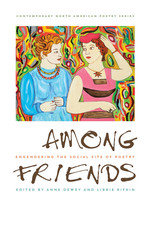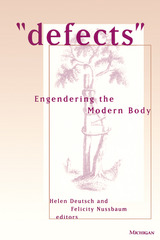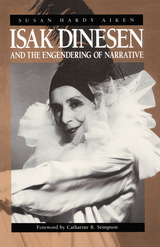3 books about Engendering

Among Friends
Engendering the Social Site of Poetry
Anne Dewey and Libbie Rifkin
University of Iowa Press, 2013
Philosophers and theorists have long recognized both the subversive and the transformative possibilities of friendship, the intimacy of which can transcend the impersonality of such identity categories as race, class, or gender. Unlike familial relations, friendships are chosen, opening a space of relative freedom in which to create and explore new identities. This process has been particularly valuable to poets marginalized by gender or sexuality since the second half of the twentieth century, as friendship provides both a buffer against and a wedge into predominantly male homosocial poetic communities.
Among Friends presents a richly theorized evocation of friendship as a fluid, critical social space, one that offers a vantage point from which to explore the gendering of poetic institutions and practices from the postwar period to the present. With friendship as an optic, the essays in this volume offer important new insights into the gender politics of the poetic avant-garde, since poetry as an institution has continued to be transformed by dramatic changes wrought by second-wave feminism, sexual liberation, and gay rights. These essays reveal the intimate social negotiations that fight, fracture, and queer the conventions of authority and community that have long constrained women poets and the gendering of poetic subjectivities.
From this shared perspective, the essays collected here investigate a historically and aesthetically wide-ranging array of subjects: from Joanne Kyger and Philip Whalen’s trans-Pacific friendship, to Patti Smith’s grounding of her punk persona in the tension between her romantic friendships with male artists and her more professional connections to the poets of the St. Mark’s scene, and from the gender dynamics of the Language School to the Flarf network’s reconception of poetic community in the digital age and the Black Took Collective’s creation of an intimate poetics of performance. Together, these explorations of poetic friendship open up new avenues for interrogating contemporary American poetry. Contributors: Maria Damon, Andrew Epstein, Ross Hair, Duriel E. Harris, Daniel Kane, Dawn Lundy Martin, Peter Middleton, Linda Russo, Lytle Shaw, Ann Vickery, Barrett Watten, Ronaldo V. Wilson
[more]

"Defects"
Engendering the Modern Body
Helen Deutsch and Felicity Nussbaum, Editors
University of Michigan Press, 2000
"Defects" brings together essays on the emergence of the concept of monstrosity in the eighteenth century and the ways it paralleled the emergence of notions of sexual difference. Women, declared a mid-eighteenth-century vindication, have been regarded since Aristotle as deformed amphibious things, "neither more or less than Monsters" (Beauty's Triumph 1758). This alliance of monstrosity with misogyny, along with the definition of sexual difference as aberration, is the starting point for this volume's investigation of monstrosity's cultural work in the eighteenth century and its simultaneous mapping and troubling of the range of differences.
This collection investigates the conceptual and geographical mapping of early modern and Enlightenment ideas of monstrosity onto a range of differences that contested established categories. The essays consider the representations and material dimensions of phenomena as diverse as femininity and disfigurement, the material imagination and monstrous birth, ugliness as an aesthetic category, deafness and theories of sign language, and the exotic, racialized deformed. Collectively, they demonstrate that the emergence of sexual difference is inextricably intertwined with the emergence of a category of the human that is imagined and deformed, monstrous, and ugly. Contributors include Barbara Benedict, Jill Campbell, Elizabeth Heckendorn Cook, Lennard Davis, Helen Deutsch, Robert Jones, Cora Kaplan, Nicholas Mirzoeff, Felicity Nussbaum, Stephen Pender, and Joel Reed.
Helen Deutsch is Professor of English, University of California at Los Angeles. Her most recent book is Resemblance and Disgrace: Alexander Pope and the Deformation of Culture. Felicity Nussbaum is Professor of English, University of California at Los Angeles. Her most recent book is Torrid Zones: Maternity, Sexuality, and Empire in Eighteenth-Century English Narrative.
This collection investigates the conceptual and geographical mapping of early modern and Enlightenment ideas of monstrosity onto a range of differences that contested established categories. The essays consider the representations and material dimensions of phenomena as diverse as femininity and disfigurement, the material imagination and monstrous birth, ugliness as an aesthetic category, deafness and theories of sign language, and the exotic, racialized deformed. Collectively, they demonstrate that the emergence of sexual difference is inextricably intertwined with the emergence of a category of the human that is imagined and deformed, monstrous, and ugly. Contributors include Barbara Benedict, Jill Campbell, Elizabeth Heckendorn Cook, Lennard Davis, Helen Deutsch, Robert Jones, Cora Kaplan, Nicholas Mirzoeff, Felicity Nussbaum, Stephen Pender, and Joel Reed.
Helen Deutsch is Professor of English, University of California at Los Angeles. Her most recent book is Resemblance and Disgrace: Alexander Pope and the Deformation of Culture. Felicity Nussbaum is Professor of English, University of California at Los Angeles. Her most recent book is Torrid Zones: Maternity, Sexuality, and Empire in Eighteenth-Century English Narrative.
[more]

Isak Dinesen and the Engendering of Narrative
Susan Hardy Aiken
University of Chicago Press, 1990
Although Isak Dinesen has been widely acclaimed as a popular writer, her work has received little sustained critical attention. In this revisionist study, Susan Hardy Aiken takes up the complex relations of gender, sexuality, and representation in Dinesen's narratives. Drawing on feminist, psychoanalytic, and post-structuralist theories, Aiken shows how the form and meaning of Dinesen's texts are affected by her doubled situations as a Dane who wrote in English, a European who lived for many years in Africa, and a woman who wrote under a male pseudonym within a male-centered literary tradition.
In a series of readings that range across Dinesen's career, Aiken demonstrates that Dinesen persistently asserted the inseparability of gender and the engendering of narrative. She argues that Dinesen's texts anticipate in remarkable ways some of the most radical insights of contemporary literary theories, particularly those of French feminist criticism. Aiken also offers a major rereading of Out of Africa that both addresses its distinctiveness as a colonialist text and places it within Dinesen's larger oeuvre.
In Aiken's account, Dinesen's work emerges as a compelling inquiry into sexual difference and the ways it informs culture, subjectivity, and the language that is their medium. This important book will at last give Isak Dinesen's work the prominence it deserves in literary studies.
In a series of readings that range across Dinesen's career, Aiken demonstrates that Dinesen persistently asserted the inseparability of gender and the engendering of narrative. She argues that Dinesen's texts anticipate in remarkable ways some of the most radical insights of contemporary literary theories, particularly those of French feminist criticism. Aiken also offers a major rereading of Out of Africa that both addresses its distinctiveness as a colonialist text and places it within Dinesen's larger oeuvre.
In Aiken's account, Dinesen's work emerges as a compelling inquiry into sexual difference and the ways it informs culture, subjectivity, and the language that is their medium. This important book will at last give Isak Dinesen's work the prominence it deserves in literary studies.
[more]
READERS
Browse our collection.
PUBLISHERS
See BiblioVault's publisher services.
STUDENT SERVICES
Files for college accessibility offices.
UChicago Accessibility Resources
home | accessibility | search | about | contact us
BiblioVault ® 2001 - 2024
The University of Chicago Press









